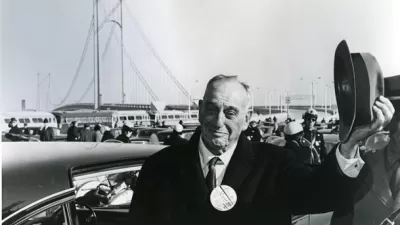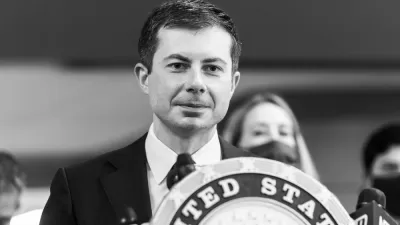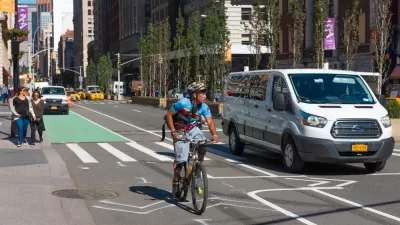The recent exhibitions on Robert Moses at the Museum of the City of New York, the Queens Museum of Art, and Columbia University have revived old debates about Robert Moses, most of which have boiled down to the question: when all is said and done, was he good or bad? When I visited the exhibitions, trying to figure out my own answer, I remembered my father’s favorite saying (lifted from Oedipus Rex): “Would you condemn me for that which made me great?"
The recent exhibitions on Robert Moses at the Museum of the City of New York, the Queens Museum of Art, and Columbia University have revived old debates about Robert Moses, most of which have boiled down to the question: when all is said and done, was he good or bad? When I visited the exhibitions, trying to figure out my own answer, I remembered my father's favorite saying (lifted from Oedipus Rex): "Would you condemn me for that which made me great?"
I don't think it should be too controversial – even if you dislike the man – to concede that Moses was a genius. The sheer quantity of roads, parks, bridges, playgrounds, and housing that he built is astonishing – and much of it of extremely high quality.
But his genius extended far beyond quantity. Moses had a rare ability to see a city as a complex organism of simultaneously moving, interconnected parts. Most of his projects are never just one thing, but in fact about five things tied together at once. Take, for example, the 1939 World's Fair, and the subsequent creation of Flushing Meadows Corona Park . For this one project, Moses cleared away an enormous ash dump, built a sewage treatment plant, cleaned the polluted Flushing River, built the Bronx-Whitestone Bridge, what is now the Long Island Expressway, and the Interboro Parkway, and, after the fair was over, created a massive new public park. (This is probably more in the way of major public works than has been built in New York over the past two decades.) So for one project, he was thinking about access, circulation, major crossings over water, creating a regional road network, enivronmental remediation, recreation, blight removal, and probably several other things that I'm missing. And it changed not only Flushing Meadows, but also Flushing Bay, eastern Queens and most of Long Island.
This approach wasn't just good planning. It was also brilliant politics. You could say that Moses built all these projects to make the Fair possible. Or you could say he used the Fair as an excuse to get funding and support for all these projects. In the end, it's chicken-and-egg – he got them built.
There are very few people who can work at such a level of complexity, and Moses was a rare person – steadfast, self-confident, savvy, able to think on an enormous scale, and undeniably brilliant. He was a visionary on a grand scale – not too different, in a way, from Kissinger, or Napoleon.
The traits for which Moses has been rightly criticized were not a separate set of flaws, but the dark side of the same traits that made him successful. (This is, of course, apart from the accusation that Moses was a racist, which is its own separate debate.) He was stubborn, egotistical, impervious to criticism, and, above all, willing to sacrifice small people for what he saw as the greater good.
People with the vision of Moses aren't just useful. They are absolutely indispensable, and irreplaceable. There is no question that Moses accomplished a great deal that is good, and that New York simply couldn't function as it does if he hadn't existed.
But a Moses – or for that matter a Kissinger – must be checked. To be useful, rather than dangerous, they need somebody above them to periodically tell them "No." Our democratic system is founded on the profound insight that all people, including good people, are flawed, and their power needs to be checked. The problem with Moses was not only Moses himself, but that nobody was willing, or able, to check him. Too often, nobody told him "No."
Massive, complex systems like cities need massive, complex personalities to manage and shape them. If we are unable to make use of a Moses, then we are impoverishing ourselves. The essential question is how to ensure that they are checked, whether through laws or through strong opposing personalities. If we don't check people like Moses, their vision runs to excess and damages us all. But if we squelch them, then we condemn ourselves to mediocrity.

Planetizen Federal Action Tracker
A weekly monitor of how Trump’s orders and actions are impacting planners and planning in America.

San Francisco's School District Spent $105M To Build Affordable Housing for Teachers — And That's Just the Beginning
SFUSD joins a growing list of school districts using their land holdings to address housing affordability challenges faced by their own employees.

The Tiny, Adorable $7,000 Car Turning Japan Onto EVs
The single seat Mibot charges from a regular plug as quickly as an iPad, and is about half the price of an average EV.

Seattle's Plan for Adopting Driverless Cars
Equity, safety, accessibility and affordability are front of mind as the city prepares for robotaxis and other autonomous vehicles.

As Trump Phases Out FEMA, Is It Time to Flee the Floodplains?
With less federal funding available for disaster relief efforts, the need to relocate at-risk communities is more urgent than ever.

With Protected Lanes, 460% More People Commute by Bike
For those needing more ammo, more data proving what we already knew is here.
Urban Design for Planners 1: Software Tools
This six-course series explores essential urban design concepts using open source software and equips planners with the tools they need to participate fully in the urban design process.
Planning for Universal Design
Learn the tools for implementing Universal Design in planning regulations.
Smith Gee Studio
City of Charlotte
City of Camden Redevelopment Agency
City of Astoria
Transportation Research & Education Center (TREC) at Portland State University
US High Speed Rail Association
City of Camden Redevelopment Agency
Municipality of Princeton (NJ)






























